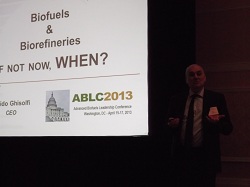 If you’ve never been to Italy, you might be inclined to believe the whole country is very much the same. But you’d be wrong. From the simmering sea shores of the southern coasts to the towering Alpine peaks of the north, where people are more likely to speak German than Italian, the whole country is a rich tapestry of diverse people, customs and foods. In that tradition, Guido Ghisolfi of the Italian company Beta Renewables told attendees of the Advanced Biofuels Leadership Conference (ABLC) that they, too, needed to be diverse in their thinking of biomass for biofuels.
If you’ve never been to Italy, you might be inclined to believe the whole country is very much the same. But you’d be wrong. From the simmering sea shores of the southern coasts to the towering Alpine peaks of the north, where people are more likely to speak German than Italian, the whole country is a rich tapestry of diverse people, customs and foods. In that tradition, Guido Ghisolfi of the Italian company Beta Renewables told attendees of the Advanced Biofuels Leadership Conference (ABLC) that they, too, needed to be diverse in their thinking of biomass for biofuels.
“It’s quite important that the [refineries] be biomass agnostic – they can take several different types of biomass without changing the hardware,” he says, adding that no matter where you are in the world, biomass is seasonal by definition, and those who want to convert the various types into fuels need to be able to change to stay in business year-round. But he admits that currently there is not one system that converts the divergent forms of biomass, whether it’s corn stover or wheat straw or even what’s left over when you press olives, into biofuels. And the technical solution might be simpler than people think.
“So far, people have not focused on the advantage of having a multi-feedstock plant. I’m pretty sure the new technologies coming up in the next few years will be able to handle many more types of biomass,” especially when the costs drive that need.
Guido says you want to bring technology to the territory so you can use all the various biomass feedstocks that an area might have. He adds that biofuels producers need to be flexible as well … and spend less time complaining.
“Instead of complaining and wailing about the RFS, we have to deliver competitive fuel that people will but because it is cheaper and not because it is green.”
You can hear my conversation with Guido here: Guido Ghisolfi, CEO, Beta Renewables

